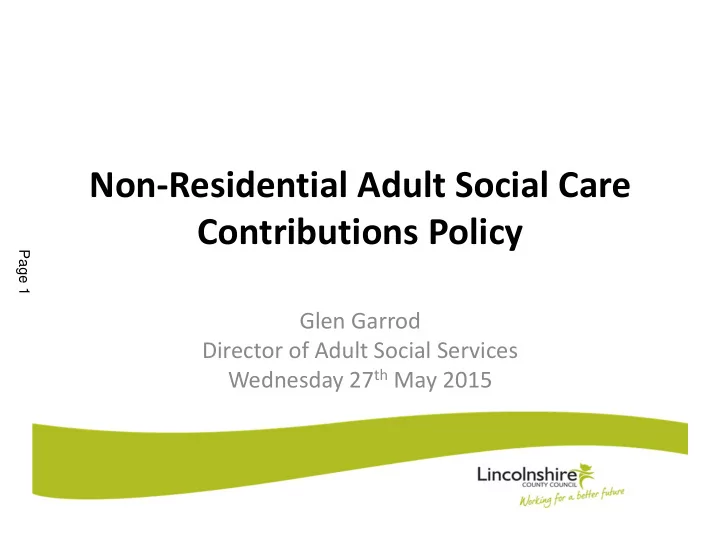

Non-Residential Adult Social Care Contributions Policy Page 1 Glen Garrod Director of Adult Social Services Wednesday 27 th May 2015
Introduction � Current policy approved in 2010 � Policy needs to be updated to represent current practice and legislation, particularly the Care Act 2014 � KPMG study 2012/13 showed income from contributions in Lincolnshire was 10% lower on older persons' services compared to Page 2 other councils � 2014 Fundamental Budget Review recommended policy should be reviewed to look at opportunities to increase income � Any significant changes proposed must be put to public consultation
Proposed changes for consultation i. To introduce a notice period for cancelling care and describe the method for calculating refunds ii. To introduce clearer rules covering the date when people begin to pay for their care iii. To assess contributions against the full cost of services received and Page 3 remove the cap on the weekly chargeable cost iv. To consider awarding Disability Related Expenses (DREs) through banded levels linked to eligibility for new customers only v. To introduce an administration fee to cover the cost of managing care for people who have savings and/or assets over the capital limits ie self- funders
Impacts � Proposal i) has no significant financial implications � Proposal ii) would give additional income estimated at £42k pa � Proposal iii) would result in increased income of £634k pa to the Council � Impact of Proposal iii) would be that people assessed as being able to afford to, expected to pay increased contributions as follows: Page 4 � 709 people with an increase of up to £10 per week � 276 people with an increase of over £10 up to £25 per week � 13 people with an increase of over £25 up to £50 per week � 12 people with an increase of over £50 up to £100 per week � 16 people with an increase of over £100 per week
Impact (continued) � Greatest impacts fall on a small number of people on higher incomes � Of those expected to pay more; 91% are older people, 5% are people with a physically disability, 3% are people with a learning disability, 3% are people with mental health problems � Proposal iv) would introduce a more efficient and consistent way of Page 5 assessing DREs � Business process efficiencies generated in assessing new customers � Some additional income may result in the long term, but no short to medium term income generation expected � Proposal v) would enable the Council to recover the cost of meeting the new duty to manage care for self-funders on request
Risks � Proposals i) and ii) are assessed as very low risk with anticipated high levels of public acceptability � Proposal iii) is assessed as medium risk with anticipated medium to low level of public acceptability. The Council has the option to consider setting a maximum charge greater than £250, but less than full maximum cost as an alternative Page 6 � Proposal iv) is assessed as medium risk with medium level of public acceptability. There may be some resistance to the introduction of fixed bands. People have a legal right to ask for their DRE needs to be assessed individually and to apply to the Waiver Panel � Proposal v) is assessed as medium risk with medium level of public acceptability. It is difficult to estimate the level of potential demand for this service � Proposal vi) is for discussion only
Recommend
More recommend